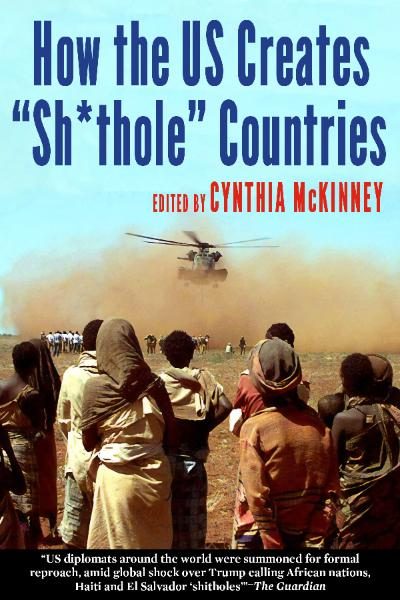How the US Creates “Sh*thole” Countries
Book Review

Whether you consider yourself already well educated on the U.S. empire or are looking for a starting place, “How the US Creates “Sh*thole” Countries” is a strong read. Cynthia McKinney has gathered together a series of essays examining features of the empire as well as a list of some of the more seriously affected victims. The histories have been covered elsewhere, but the essays here provide new perspectives as well as refreshers as to what has occurred in many different parts of the world.
The book is divided into four parts. The first helps define some of the parameters around the overall concept of empire. The second and longest section provides the grist, histories of U.S. interventions and influences in all regions of the world, including its own colony of Puerto Rico. The manipulation by way of propaganda is the third section explored in three essays. Finally the U.S. is examined itself as an example of a “sh*thole” country.
Some highlights
I have no intention of repeating what the various authors have written but there are several quotes and essays I took note of as I read through that present the overall gist of the writings.
From the first section Wayne Madsen notes, a “high level Israeli intelligence penetration of the 2016 Donald Trump presidential campaign” in association with the UAE and “a murky Canadian company”. And you were worried about Russia? Following this The Saker is the only writer to comment on the U.S.’ direct financial interest in all recent actions as he wonders about the “new reality immediately raises the issue of what will back the US Dollar in the future since in this, US military power has played a significant role.” Finally there is blowback in the form of immigration as James Petras outlines how the immigrant ‘problems’ of both Europe and the U.S. stem from neocolonial wars in Africa/Greater Middle East and Latin America.
The second section takes the reader through what is for many a familiar landscape: Haiti, Afghanistan, Philippines, Vietnam, Palestine, Africa in general and Somalia, Rwanda and Congo in particular before sliding over to Latin America and events in El Salvador, Venezuela, and Puerto Rico.
I found the essays on Africa to be very strong with new material alongside old familiar information. Africa in general is a mess for many reasons, but all add up to some form of neocolonialism. Much has to do with multinational corporations, especially mining and oil companies, harvesting African wealth under the protection of private militaries and state militaries trained and guided by the U.S. The World Bank and the International Monetary Fund play a significant role by making loans countries are unable to finance and which are then held in financial captivity through various actions involved with their “structural adjustment programs.” Oil of course plays a large role, along with Chinese influences as seen with U.S. actions in Somalia and Sudan.
There are three essays relating to the Congo and its interactions vis a vis Rwanda. I have never fully understood that relationship, but the combination of these essays allowed my mind to sort out the pieces I knew about into a comprehensive and integrated whole. Essentially, it is the story of NGOs, private corporations, CIA/Mossad, covert militaries all part of western white control extracting Central African wealth with the help of their crony war lords in governance. The focus on Rwanda is revealing indicating through a recounting of the history, and an analysis of the propaganda machine that the west has produced a story pretty much backwards to the reality. For Central Africa “this is genocide [italics in original] against African people of diverse ethnicities, and it is genocide perpetrated by white power interests.” The footnote to this phrase reiterates, “There is a very clear political economy of genocide…at work here.”
In the section on propaganda, Christopher Black, an international Canadian criminal lawyer, argues that propaganda “is a war crime because the propaganda is used to provoke war, to sustain war, to turn other people, declared to be the enemy, into beings that need to be killed.” This is the history of U.S. imperialism in its shortest form, expressing the need to create an ‘other’, a person or group of people who are the enemy and can be killed without moral concern. Without the other – be it indigenous Indians, Spanish freedom fighters, Bolshevists, communists, terrorists, Muslims, and now focused on Russians in general and Putin, the penultimate U.S. bad guy in particular – without these ‘other’ to be condemned the U.S. war machine, the military-political-corporate-financial matrix would not be able to survive.
The last section looks at the U.S. itself as a “sh*thole” country and while it is not an incorrect perception, it is not nearly as hard hitting as it could be. On the other hand, after reading about how the U.S. interacts with all the other countries as presented earlier, perhaps there is not a need to do so – it is self evident simply from how they treat others and how the economy is structured to create “sh*tholes” at home or abroad. The final essay by Philip Alston outlines the U.S.’ domestic “sh*thole” qualities, all easily recognizable within the manner that corporations and politicians act at home for their own aggrandizement.
From Trump’s scatalogical mouth and mind the epithet “sh*tholes” is a reflection of how the U.S. operates overseas as well as domestically. Cynthia McKinney has gathered together a series of essays examining Trump’s scatology, himself the true representative of what underlies U.S. foreign policy without finesse or filter. “How the US Creates “Sh*thole” Countries” needs a place in everyone’s library in their anti-empire section.
*
Note to readers: please click the share buttons above. Forward this article to your email lists. Crosspost on your blog site, internet forums. etc.
Jim Miles is a frequent contributor to Global Research.

